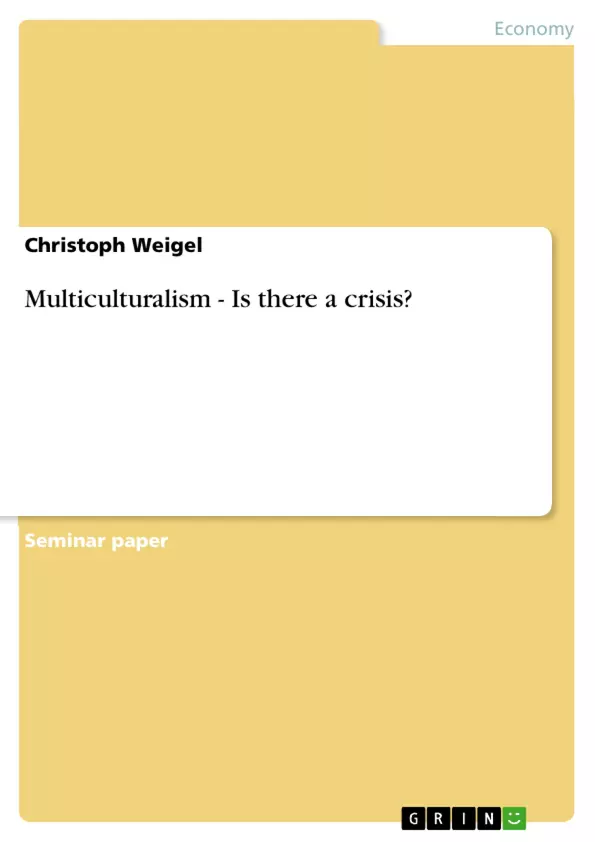Migration is not a temporary fashion. For thousands of years people have left their
native country to build a new existence. But there are different reasons like economical,
societal or political factors. Most people tried to find their self-determination, but there
were stampedes due to wars or natural catastrophes, too. (cf. Karl Kübel Stiftung 2006)
Pierre Eliot Trudeau, the former Canadian prime minister, said that the power of a
country is not only about military or economy but also about liberality and openmindedness.
But after the attack of the World Trade Centre in 2001 by Islamic
terrorists, an antipathy against foreigners emerged in many countries. The fear of
different cultures in the own country pushes the care about the national engagement and
the loyalty between the population. In industrial countries migrants are often shown as a
lower-level community which wants to profit from the better social system. But it
should be noted that in most countries the migration and integration policies do not play
an important role. (cf. Heinrich Böll Stiftung 2006)
But in a slow process the picture of migrants will be changed. More and more migrants
can be found in higher positions in economy or politics. For example Philipp Rösler has
Vietnamese roots and is the leader of the German party FDP. Another very important
change will take place in the CEO position of the Deutsche Bank AG. Anshu Jain with
an Indian background will replace Josef Ackermann and so the most significant bank of
Germany will be led by a foreigner. This change causes a lifting of the community of
migrants. Migrants do not only stress the societal system of industrial countries, now
they want to replace natives in the higher society. (cf. Ljoma Mangold 2011)
These problems show that the principle of multiculturalism in industrial countries
involves a high potential for conflicts. Some industrial countries try to find political
solutions to handle the migration problem and the problem of different cultures in one
country. But it is not easy due to incompatibleness between the behaviour of different
cultures. Others are the ideas of man or social, right and financial perceptions of the
native country on the one hand and the foreign cultures on the other hand.
Inhaltsverzeichnis (Table of Contents)
- Introduction
- Problem statement
- Objective and delimitation
- Cultures
- Cultural globalisation and migration
- Multiculturalism
- Germany's policy of multiculturalism
- Canadian's policy of multiculturalism
- Conclusion of the results
- Summary
Zielsetzung und Themenschwerpunkte (Objectives and Key Themes)
This thesis explores the complexities of multiculturalism in industrial countries, specifically focusing on Germany, with the primary objective of determining whether or not multiculturalism presents a crisis. To answer this question, the thesis delves into various sub-objectives, such as defining and understanding cultures, examining the implications of multiculturalism in a globalized world, and analyzing different policy approaches to managing multicultural societies.
- The development and significance of cultures in human societies.
- The impact of globalization and migration on multiculturalism.
- The challenges and potential conflicts associated with multiculturalism.
- The different approaches to managing multiculturalism in industrial countries.
- The future development of multicultural communities.
Zusammenfassung der Kapitel (Chapter Summaries)
- Introduction: This chapter introduces the issue of multiculturalism in industrial countries, emphasizing the increasing migration and the potential conflicts arising from cultural differences. It highlights the importance of understanding and addressing the complexities of multiculturalism in a globalized world.
- Cultures: This chapter delves into the multifaceted nature of cultures, exploring their development, significance, and diverse interpretations. It utilizes the theory of Geert Hofstede to highlight the differences between cultures and provide a foundation for understanding the complexities of multiculturalism.
- Cultural globalisation and migration: This chapter focuses on the interconnectedness of cultural globalization and migration, examining their impact on the formation and evolution of multicultural societies. It explores the challenges and opportunities presented by the increasing interaction of different cultures in a globalized world.
Schlüsselwörter (Keywords)
The core focus of this thesis revolves around the concept of multiculturalism, exploring its implications in a globalized world. Key keywords include cultures, migration, globalization, cultural differences, integration, policy approaches, and the potential for conflict in multicultural societies.
Frequently Asked Questions
Is multiculturalism currently facing a crisis in industrial countries?
The thesis explores this complex question by analyzing the potential for conflict arising from cultural differences and evaluating how countries like Germany and Canada manage their multicultural societies.
Which countries are specifically compared in their approach to multiculturalism?
The research focuses on a comparison between Germany's policy of multiculturalism and Canada's policy of multiculturalism.
What role does globalization play in multiculturalism?
Cultural globalization and migration are interconnected, leading to the formation of multicultural societies. The thesis examines how this interaction creates both challenges and opportunities in a globalized world.
Which theory is used to understand cultural differences?
The thesis utilizes the theory of Geert Hofstede to highlight the differences between cultures and provide a foundation for understanding multicultural complexities.
How has the perception of migrants changed in high-level positions?
The text notes a shift where migrants are increasingly found in higher positions in economy or politics, citing examples like Philipp Rösler in German politics and Anshu Jain at Deutsche Bank.
What factors trigger migration according to the study?
Migration is driven by various factors, including economic, societal, and political reasons, as well as wars or natural catastrophes.
- Quote paper
- Christoph Weigel (Author), 2012, Multiculturalism - Is there a crisis?, Munich, GRIN Verlag, https://www.grin.com/document/187297



